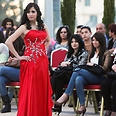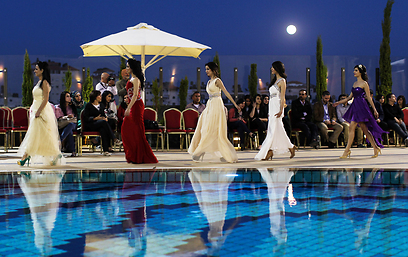
“Every country has a fashion week and we thought that we can have a fashion week of our own, instead of smaller fashion shows here or there," Tamer Halabi, general manager of Modelicious Agency, one of the event's organizers, told The Media Line.
Halabi teamed up with the Palestinian lifestyle magazine Layalina and Haifa-based fashion photographer Wissam Rustom six months ago to organize this ambitious project.
“Layalina ('Our Nights') Magazine cares about fashion and modeling and we noticed that there is a larger demand lately, so we thought of organizing a national annual event,” Summer Husain, the magazine’s Palestinian-American managing editor said.
Halabi, a 27-year-old entrepreneur from Jerusalem, opened the first modeling agency in the West Bank, saying that boutiques and fashion shops are asking for more models to advertise their designs, especially on their Facebook pages.

Runway fashion shows at Grand Park Hotel(Photo: EPA)
Palestine Fashion Week was devoted to the new summer collections of Palestinian designers.
“We received calls from designers abroad but we wanted to make the show purely Palestinian, at least in its first year,” fashion photographer Rustom told The Media Line. He also hopes it will convince more Palestinian designers to stay at home.
“It’s a shame that most of the talented designers find their haven outside of the country,” he said.
While some Palestinian designers incorporate traditional Palestinian embroidery into their designs, this event did not highlight that style. "We haven't received any stores or designers who make Islamic or conservative clothing," Rustom said. Instead, this event will showcase a more international look in formal, casual and sport clothing which appeals to elite Palestinian shoppers.
'We are able to live just like people abroad'
Amani Masri, a businesswoman from Nablus, attended the Fashion Week event. "I support fashion in Palestine and if I find something special I might buy it," she told The Media Line. She usually travels to the US or Europe to buy her clothing, but sometimes enjoys window-shopping in the Palestinian territories.
Other women, such as Asrar Bazzar, prefer to shop in Jerusalem or Amman. Bazzar says the only two boutiques in Ramallah she patronizes import high-end “one-of-a-kind” designs from Turkey. "I like to buy clothing that no one else is wearing," Bazzar said.
Event organizers expected about 250 to 300 people to attend each day, with tickets costing $5.50 each. "Our purpose is not to make a profit, but to advance the culture and fashion in Palestine," claimed Rustom.
Boutique owners hope to sell their fashions to a wider audience outside of Ramallah.
“I was more excited when I heard that people from Jerusalem and lands of 1948 are coming to the show,” Hadeel Abu Hmied, the owner of the Divine Bridal dress boutique, told The Media Line,” referring to Arab citizens of Israel. “They have access to come to us but we don’t have access to them.” Abu Hmied said she would show 10 dresses imported from the US and Spain at the show.
The models, 20 female and 10 male, came from Bethlehem, Ramallah, Jerusalem, Nablus, Acre, Haifa and Nazareth. They were chosen through auditions and underwent intensive training by Rustom.
“The Arab-Israeli models were more experienced than the models from the West Bank,” said Rustom. He believes that their participation encourages West Bank women to become more open despite traditional Palestinian mores which frown on models as immodest.
"I also think that Layalina Magazine helped make a change in the culture. A year ago, the Lebanese pop singer Nancy Ajram was on the cover of the magazine's first edition. Now the magazine has photos of Palestinian models, which is encouraging more women to want to be on the covers," Rustom told The Media Line.
Displaying models in magazines and especially on billboards is still problematic, although Rustom believes that there is a growing sense of liberalism in Palestinian society. "Women usually think about the society and what would people say about them if they are showing their beauty in public, but this is changing slowly," he said.
Halabi's Modelicious Agency signed contracts to represent 35 models and he and Rustom expect to send some of the models to international venues by the end of the year.
Halabi admits that some Palestinians might criticize them for focusing on fashion instead of struggling for a Palestinian state. Yet, he says, it is still important.
“We want to show the world that we can host a fashion week. We have talents and are able to live just like people abroad,” Halabi said. “The political problems have existed for a long time, but that doesn’t mean we shouldn't have a life," he said as he applied the final touches to the runway.
Article written by Diana Atallah
Reprinted with permission from The Media Line















